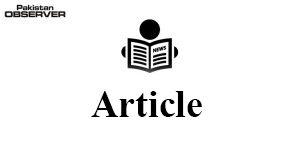Dr Muhammad Khurram
RECENTLY I came across a lot of friends who were really confused about Brexit. Some though Britain was still in the EU while others thought she had left. This prompted me to give a brief overview of recent developments. I have intentionally skipped the referendum part of 2016 as I have assumed most readers would have a fair idea of the same. Following the referendum, the EU and Britain negotiated a ‘withdrawal agreement’ which would govern terms of Britain’s departure from the EU. On 23 January 2020, the withdrawal agreement was ratified by Parliament of the United Kingdom, and on 29 January 2020 by the European Parliament. The UK left the EU on 31 January 2020 at 23:00 GMT ending 47 years of membership. However, the agreement allowed things between the EU and Britain to continue without change. The transition period (sometimes called the implementation period) ended on 31December 2020. It could not have been extended beyond that date. While in transition, the UK remained in both the EU Customs Union and single market. Intense and bitter negotiations were the hallmark of the transition period resulting in a trade deal on 24 December 2020. The agreement, called the EU-UK Trade and Cooperation Agreement (TCA), was ratified by the British parliament on 30 December2020 while the European Parliament would consider it in January 2021.
It may be recalled that while Britain was in the EU goods could be traded between them without payment of duties and there was no limit or quota on the quantity of goods being traded. TCA allowed this to continue by providing for free trade in goods and limited mutual market access in services. Compared to the UK’s previous status as an EU member state, on the 1st of January 2021 the following ended as they are not incorporated in the TCA or the Brexit withdrawal agreement: UK membership in the European Single Market and Customs Union and cooperation in certain law enforcement, security and education. Freedom to work and live between the UK and the EU also comes to an end, and in 2021, UK nationals will need a visa if they want to stay in the EU more than 90 days in a 180-day period. As the UK has left the EU, she will be free to negotiate her own trade agreements with other countries. In fact, talks are being held with the US, Australia and New Zealand for such bilateral trade agreements. A blow to agreement with the USA might be President-elect Joe Biden’s statement that bilateral trade deals would not be a priority of his government. Although there would be no new taxes, loads of new paperwork would impose an impediment for traders of the EU and Britain. While the UK has decided to delay making most checks for six months to allow people to get used to the new system, the EU will be checking paperwork from the 1st of January 2021. UK’s Government Minister David Gove cautioned British traders to be ready to face some ‘bumpy moments’.
Regarding provision of services like banking, matters are far more complicated although complete details are not yet available. Rather than following a single set of rules for the EU, UK businesses would have to comply with regulations of each member country which is likely to be cumbersome if not impossible. Also, professionals providing cross border services would find it difficult to sell their services in the EU. Such individuals will need to check each country’s rules to make sure their qualification is still recognized. Interestingly, some issues, though of minor economic importance, created more disturbance during negotiations due to their political weightage. Fishing was one such issue. ‘Regaining control over our waters’ became a rallying cry for leave campaigners during the 2016 campaign in the UK. Being a part of the EU, the UK had allowed EU boats to fish in UK waters. This is to continue in the coming years. However, both sides have agreed that 25% of EU boats’ fishing rights in UK waters will be transferred to the UK fishing fleet over a period of five years. Under plans outlined in the deal, EU fishing quota in UK waters will be reduced by 15% in the first year and 2.5 percentage points each year after. By 2026, it’s estimated that UK boats will have access to an extra £145m of fishing quota every year. In 2019, British vessels caught 502,000 tons of fish, worth around £850m, inside UK waters.
There will be annual negotiations between the EU and Britain to decide how the fishing catch is shared between the two. After 2026, the UK would be at free will to exclude EU boats from UK waters. This may not be a viable option as the EU could retaliate by imposing duties on fish imports from the UK or ban UK boats from fishing in EU waters. Of course, there are some issues which may appear minor to outsiders who cannot comprehend the true impact of such measures. These include European Health Insurance Cards (EHIC), pet passports and other issues for visitors. Apparently, despite the withdrawal agreement and TCA, both Britain and the EU would need to go through continuous negotiations to allow for smooth working relations. Winners and losers of Brexit would only emerge as time unfolds mysterious curtains wrapping this extraordinary development.
—The writer is a civil servant having an LLM from Harvard Law School, MSC from University of Oxford and an LLM from University of Turin/WIPO Academy.










